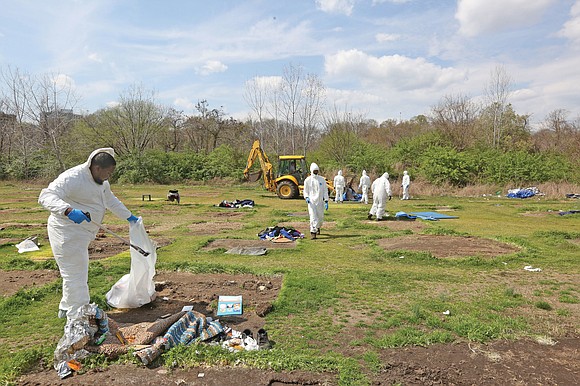Cathy’s Camp razed, but people keep coming during pandemic
Jeremy M. Lazarus | 3/26/2020, 6 p.m.

Homeless people keep coming despite the destruction last week of Cathy’s Camp, the tent community in Shockoe Valley, and the relocation of its residents to area motels and hotels.
As efforts are underway to expand shelter resources, and as courts and sheriffs halt evictions to keep homelessness from becoming worse amid the coronavirus outbreak, evidence from the camp indicates that some people are still in crisis.
Even as a light rain fell Wednesday with the tents gone, at least seven people were sleeping under tarps in the driveway and
on the concrete sidewalk outside the adjacent but closed Annie Giles Community Resource Center on Oliver Hill Way, the city’s cold weather shelter that sits across from the city’s jail.
The Giles Center opened Wednesday night, as required, as the temperature plunged below 40 degrees, offering floor mats to those who entered.
However, Mayor Levar M. Stoney has so far rebuffed calls from advocates and legal aid lawyers to keep the building open during the day as a refuge for those without housing. Before the tents came down, the Stoney administration, at the insistence of 2nd District Councilwoman Kim B. Gray and others on City Council, opened the building for a few days to allow camp residents to use the bathrooms and wash their hands. But that practice ended March 20 after camp residents were relocated and their tents were removed.
Once the camp residents were gone, city employees, some dressed in hazmat suits, cleared away all of the tents and personal items, leaving only the grass in the large area beside the Giles Center where the tents once stood.
Large signs posted at the site state that the area has been cleaned up to protect against the spread of coronavirus and that the area will be fenced off.
“It’s heartbreaking,” resident Burney Makk said as he packed his belongings in plastic bags last Friday and waited for a volunteer to take him and others to the Rodeway Inn near the airport.
“This is our home, and they are destroying it in the name of safeguarding us from the virus,” said Mr. Makk, 46, a disabled construction worker who lived at the camp during the winter as his most affordable option.
“We’re safer here. No one was sick from the virus, and we had each other,” he said. “But no one wants to listen to us.”
He was among the final 13 people transferred. At least three people declined to move and were left. Others have come since.
Rhonda Sneed, co-founder and leader of Blessing Warriors RVA, an all-volunteer support group for the homeless that helped establish the camp, continues to bring food and water to those who remain. She also visits dozens of others who have been moved.
Neither the city nor Homeward, the regional umbrella group for homeless services, has issued final numbers about how many people were relocated. About 75 people occupy about 60 rooms at the Rodeway Inn in Henrico County near the airport, with smaller groups housed at the Massad House Hotel in Downtown, the Diamond Inn & Suites next to The Diamond in North Side, a Super 8 in Henrico County and a motel in the Midlothian area.
The move was disruptive but the initial kinks appear to have been worked out, particularly the delivery of meals.
Dr. Arlene Simmons of Chesterfield County, who runs the nonprofit Humanitarian Ambassadors of America, said she is arranging to provide at least two meals a day to the 75 people who at the Rodeway Inn.
The Stoney administration created a $2.1 million fund to cover housing and meal costs at least through April 3. The money is flowing through Homeward.
Mr. Makk, like others who were moved, is concerned that once the free lodging ends, everyone will be looking for a new tent location.
“We’re working to find additional shelter and program space, something that would be good for two to three months at least,” said Kelly King Horne, Homeward’s executive director. That would allow the individuals and case managers more time to focuses on their challenges and on finding solutions, she said.
Currently, she said, virtually all of the existing housing for the homeless, including permanent, transitional and emergency housing, is crammed. About 1,300 individuals are being housed, not including those recently removed to hotels, according to Homeward data.
She expressed relief that evictions have been put on hold.
Ms. Horne also said she is working with federal and state partners to obtain resources that could be matched. Along with the city, she said a host of partners and volunteers are stepping up to keep homeless people safe from coronavirus.
“Given what we know, many of those who are served are older and have chronic health issues that make them more susceptible,” she said.
She said she is unaware of any former residents of Camp Cathy or other people being sheltered who have tested positive for the virus.
Still, she is trying to arrange for a separate space where anyone who tests positive may be quarantined.
Already, she is planning for the fall. There are worries that, even if COVID-19 dies down in the summer, it could return in the fall like the flu, potentially creating another wave of homeless.
“Homelessness was a crisis before the pandemic,” she said. “This only makes it more of a challenge.”






